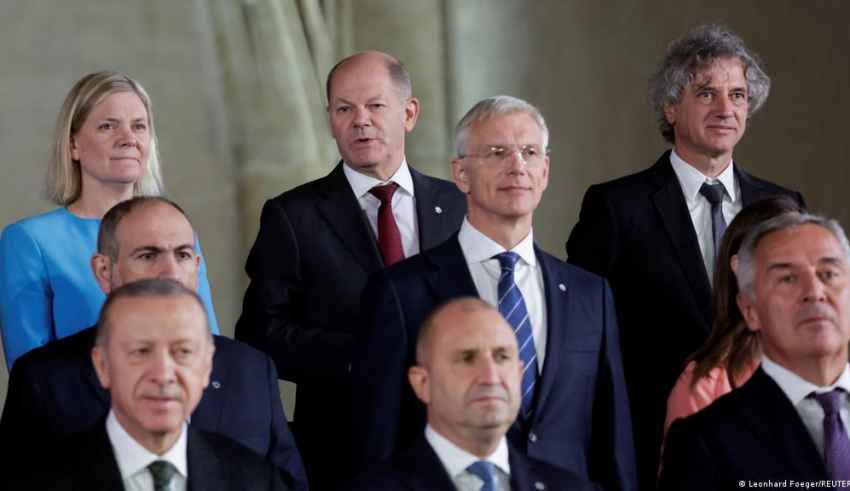
In Prague, 44 heads of state and government from all over Europe gather for the first meeting of the European Political Community. Only Belarus and Russia did not receive an invitation.
The family photo could very well go down in the history books. Today, October 6th, all European states are represented in Prague except two : Belarus and Russia. British Prime Minister Liz Truss is coming, as is Turkish President Erdogan. Ukraine will be represented by Prime Minister Denys Shmyhal. It is the first meeting of the European Political Community, an initiative of French President Emmanuel Macron. And it is meant to send a clear signal to Moscow : Europeans stand by Kiev, they will not be divided.
“We stand together – not only the members of the European Union, but all European countries”, the heads of government of the Netherlands and Albania, Mark Rutte and Edi Rama, put it in a guest article for the Internet magazine Politico. They said the Russian incursion forced everyone to think about how to protect their values and democracy. “It is self-evident that we need a strong, ongoing and united Europe”, they wrote. They cited energy supply, the climate crisis, cybersecurity and common trade as common challenges.
No final declaration
The heads of state and government will first meet at 1 p.m. in a plenary session. Czech Prime minister Petr Fiala will speak as host, as well as Rama, Truss, Norwegian Prime Minister Jonas Gahr Støre and Ukrainian President Volodymyr Selenskyj, as usual video-connected from Kiev. It was important for the EU side not to dominate the meeting. In general, it is pointed out everywhere that this is not an “EU plus” format, but a meeting of the states. However, Ursula von der Leyen is also taking part as President of the EU Commission. The preparation and invitations lay mainly with Czech Prime minister Petr Fiala and Charles Michel, the President of the European Council.
After the family photo, the heads of state and government are to exchange views in a smaller format. There will be two roundtables each on the topics of peace and security and energy, economy and climate. Such a discussion format has already been tried out at the EU-Africa summit. Later in the afternoon, there will be two and a half hours for bilateral talks before meeting again for dinner at 7 p.m. to discuss the individual debates.
There will be no final declaration; that would have required weeks of negotiations. Wjich is a good thing, direct and open exchange is more important. But the EU side will insist that its partners join the sanctions against Russia. Serbia and Turkey, for example, have so far refused, even though both are candidates for EU membership.
Struggle over Erdogan’s invitation
The fact that all those invited accepted was by no means a foregone conclusion. Truss, for example, had stated in June that she did not think much of the format, at that time still as foreign minister. In the election campaign for the Conservative Party presidency, she called it an “open question” whether Macron was a “friend or foe”. He, of all people, had campaigned early on to include the United Kingdom via the new format after Brexit. The British prime minister came to Prague on Thursday with a call to continue supporting Kiev with unity and determination in its war against Russia. But Truss also asked to keep open the oil and gas pipelines that connect the island to the continent – an acknowledgement of Britain’s dependence on the continent.
Whether Erdogan should be invited was again part of a political wrangling in Brussels. Greeks and Cypriots would have liked to keep him at arm’s length. What probably is the result of the fact that Turkey has abandoned several pillars of the European consensus on values. However, excluding the Turkish president could have serious consequences for Sweden and Finland. Both countries are waiting for the Turkish parliament – just back from its summer recess – to ratify their accession to NATO.
In the case of Armenia and Azerbaijan, it was not clear whether they would be able to come to the table, given their recurring hostilities. As recently as September, fighting had erupted, leaving several hundred dead. But European Council President Michel then managed to lure both to Prague. Both countries belong to the EU’s Eastern Partnership, as does Belarus. Minsk, however, did not receive an invitation because it supports Putin’s attack on Ukraine and is subject to manifold sanctions.
A meeting of all Europeans was proposed by French President Macron in May. In doing so, he took up the idea of a European Confederation, which Francois Mitterrand had developed in 1989 after the fall of the Iron Curtain. At the time, however, Mitterrand wanted to involve the Soviet Union – which met with resistance from the East Central Europeans and led to the initiative petering out in 1991. This became clear at a meeting in Prague, of all places, to which the United States and Canada were also invited.
The European Political Community – without Russia – is to be given a longer life. The plan is for the heads of state and government to meet in this format twice a year in the future, the next time in a country outside the EU. Several countries have applied for hosting, including the United Kingdom and Moldova. Who gets the nod is the only real decision pending in Prague since unfortunately no formal declaration is issued after the summit…
References
https://abcnews.go.com/International/wireStory/europes-leaders-gather-prague-russia-invited-91094170
https://theconversation.com/debate-what-european-political-community-do-we-need-now-183380
By The European Institute for International Law and International Relations.















